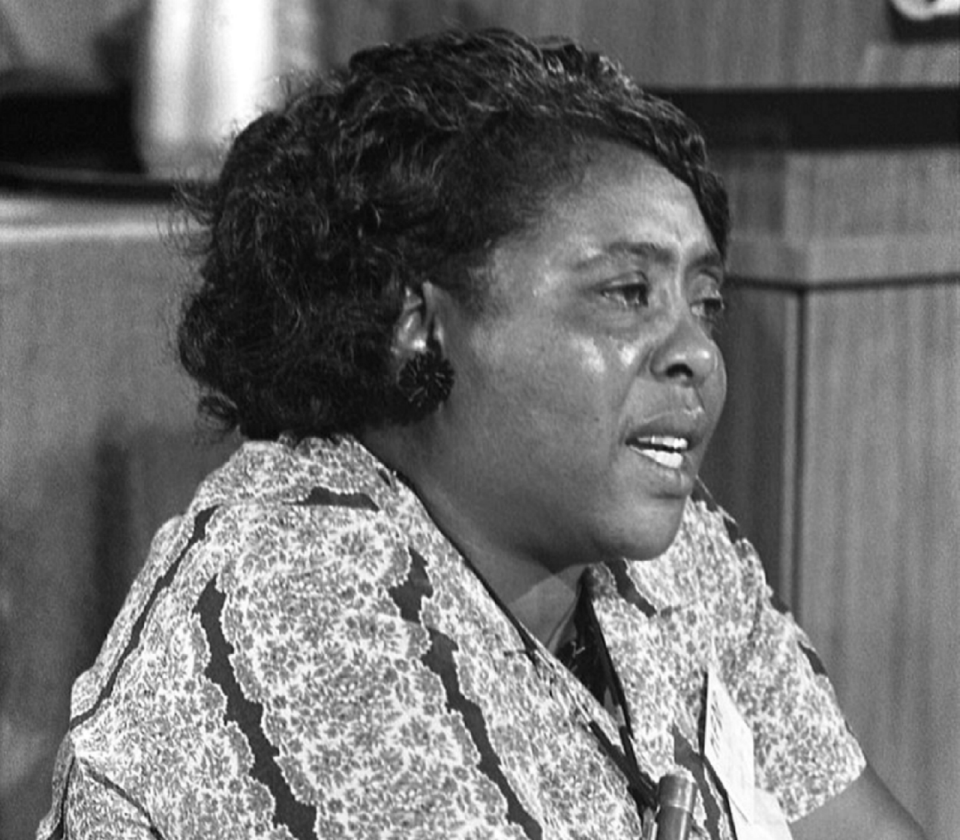|
Shortly before the Nineteenth Amendment became a reality, in October 1917, Fannie Lou Hamer (nee Townsend) was born into a Mississippi sharecropper family. The youngest of 20, she was picking cotton at six and left school at 12 p.m. each day to work. In the early 1940s, she met and married Perry (Pap) Hamer, and they continued plantation work. Her ability to read and write allowed her to serve as recordkeeper.
In 1961, Hamer, like many of her contemporaries, was the victim of forced sterilization without her consent when a white doctor was performing other surgery. This attempt to control the black population was one factor precipitating her activism. She attended a Student Non-Violent Coordinating Committee (SNCC) meeting. “They talked about how it was our rights as human beings to register to vote. I never knew we could vote before. Nobody ever told us.” She became an organizer and in the summer of 1962, led 17 neighbors to the Indianola, Mississippi, courthouse to register to vote. They were unsuccessful. Upon return, her employer, objecting to her trying to register to vote, fired her. In 1963, traveling home from a workshop, she and other organizers sat at the whites-only lunch counter and were arrested. In jail, she was so severely beaten, effects to her eyes, legs, and kidneys lasted the rest of her life. Hamer cofounded the Mississippi Freedom Democratic Party (MFDP) in 1964 in response to the Democratic Party’s attempts to block the participation of black folks. She spoke at the Democratic National Convention and addressed the Credentials Committee, demanding mandatory integrated state delegations. Hamer and the MFDP were noticed, nationally, although the request was denied. Her work was an integral part of the Freedom Summer that brought hundreds of students south to fight for civil rights. Despite objections, Hamer supported the white students, encouraging an integrated movement. She said, “If we’re trying to break down this barrier of segregation, we can’t segregate ourselves.” Hamer identified economic security as the key to achieving civil rights. She did relief work, started the Freedom Farm Cooperative (buying land that black people could own and farm collectively), and secured 200 units of low-income housing. Even after the Voting Rights Act of 1965, Hamer’s work was not done. In 1968, she was a member of Mississippi’s first integrated delegation, and three years later helped found the National Women’s Political Caucus. Her injuries from the jail beating and breast cancer slowed her down by the mid-1970s. She died in 1977. The fight for the unfettered right to ballot access continues today. If you’re “sick and tired of being sick and tired,” you are in good company. When Fannie Lou Hamer said that, she didn’t let it stop her. And it can’t stop us.
0 Comments
Leave a Reply. |
HISTORY
April 2024
Categories |
© Walk 4 Change. All rights reserved.


 RSS Feed
RSS Feed